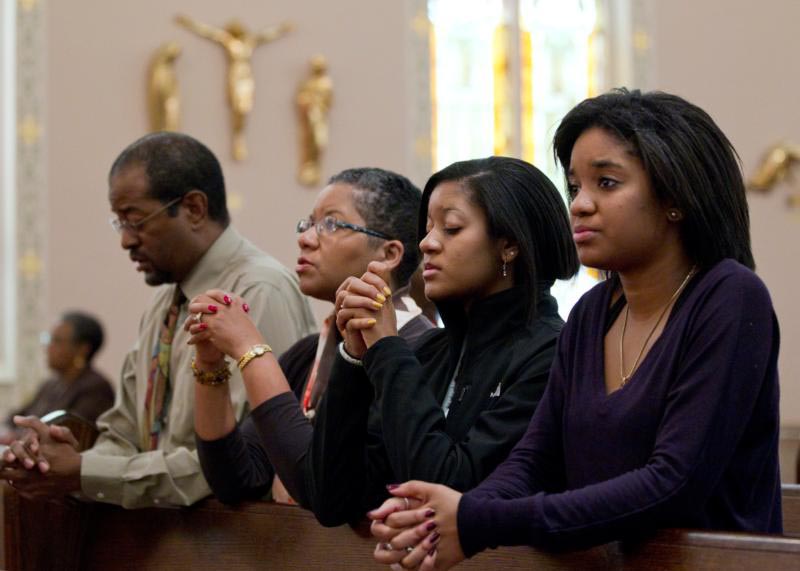
A family prays after arriving for Sunday Mass at St. Joseph’s Catholic Church in Alexandria, Va. Holy leisure is about spending time with family — quality time, face time, truly giving ourselves over — and giving our lives to God. (CNS photo/Nancy Phelan Wiechec)
The Fathers of the Church often spoke of the concept of “otium sanctum,” or “holy leisure.” In the later works of St. Augustine, he would use this term to refer to the monastic life, in which the monk is free of everyday obligations and can devote his time to study and prayer.
However, it is not only the cloistered who are called to live this “otium sanctum”: all are to live lives of holy leisure.
We all recognize the need to set aside time for important things. How often do we tell ourselves we are too busy to do something? When something is important, you make the time.
[hotblock]
If we have a deadline coming up at work, we make sure that we get the project completed, even if it means coming in early, staying late or putting aside other projects. This example certainly illustrates the point: When we recognize that something is important, we simply make it happen. We do everything we can to accomplish what is set before us.
How much more, then, should this be the case with this idea of holy leisure?
Holy leisure is not about doing what we want. It’s about taking the time to do the important things that we let ourselves put off the rest of the week. It is about spending time with family — quality time, face time, truly giving ourselves over — and giving our lives to God.
It is not just about spending an hour at Mass on Sunday, or even spending an additional hour at the coffee and doughnuts social afterward. We need to commit ourselves to consciously giving that time to the Lord.
Part of the importance of holy leisure comes from the Third Commandment, which decreed an observation of a Sabbath day each week. For Christians, this day of rest is Sunday.
Contrary to popular understanding, Sunday has not supplanted Saturday as the Sabbath. The Sabbath was, and remains, the seventh day of the week: Saturday. But Christians commemorate Sunday as their holy day, the memorial of the resurrection of Jesus, as the work of Christ fulfilled what the Sabbath was pointing toward.
What Christians mark on Sundays is not strictly the “Sabbath,” but something the Sabbath prefigured: the Lord’s day. The Catechism of the Catholic Church states, “For Christians, (Sunday’s) ceremonial observance replaces that of the Sabbath. In Christ’s Passover, Sunday fulfills the spiritual truth of the Jewish Sabbath and announces man’s eternal rest in God” (No. 2175).
Furthermore, the catechism goes on to say that “the institution of the Lord’s day helps everyone enjoy adequate rest and leisure to cultivate their familial, cultural, social and religious lives” (No. 2184).
Pope Benedict XVI provided a wise insight on this matter in his encyclical “Charity in Truth,” advising us of the importance of keeping eternal life at the forefront of our minds, and living so that we strive for more than material accomplishments:
“Without the perspective of eternal life, human progress in this world is denied breathing space. Enclosed within history, it runs the risk of being reduced to the mere accumulation of wealth; humanity thus loses the courage to be at the service of higher goods.”
Jesus said clearly that “the Sabbath was made for man, not man for the Sabbath” (Mk 2:27). We should not be scrupulous about whether or not we are doing too much work on Sunday — certainly, there are things that need to be done.
[hotblock2]
If you are driving and get a flat tire, the tire must be changed; if a tree falls in your backyard and breaks a window, that must be repaired; there are a number of exceptional circumstances we could easily come up with.
But the spirit of the proscription remains: We must diligently and conscientiously set aside time for the Lord, time for our families, time for ourselves.
How are we to understand where the line is when trying to discern what amount of work is appropriate and how to let ourselves observe this holy leisure? The catechism once again gives us guidance here:
“On Sundays and other holy days of obligation, the faithful are to refrain from engaging in work or activities that hinder the worship owed to God, the joy proper to the Lord’s day, the performance of the works of mercy and the appropriate relaxation of mind and body.”
The catechism continues, “Family needs or important social service can legitimately excuse from the obligation of Sunday rest. The faithful should see to it that legitimate excuses do not lead to habits prejudicial to religion, family life and health” (No. 2185).
This time is more than just “down time.” It is more than simply time between commitments, time between chores.
This should be the day that our whole week revolves around, and what we spend every moment working toward: the day we give ourselves over completely to our loved ones and receive our Lord in the Eucharist.
It is a day where we intentionally set aside other commitments and troubles, and simply be present with those we love.
***
Senz is a freelance writer living in Oregon with his family.
PREVIOUS: In the Bible, Jesus shows how to take time for prayer
NEXT: Too busy for God? Not so, and here’s how


Share this story